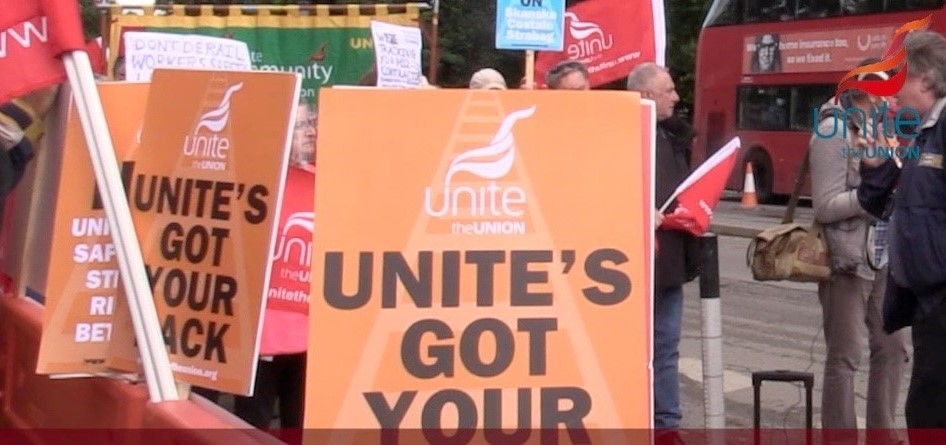‘One death is one too many’
Just as Unite members, mostly in construction, gathered at the building worker’s statue in London to mark International Workers’ Memorial Day (IWMD) today (April 28), news broke that yet another of their fellow brothers in construction fell to his death that very morning at a site not even a mile away.
It is thought that the man took his own life.
Workplace suicides are among the many causes of death in construction, which is rife with hazards from accidents to exposure to toxic materials.
But construction is not the only sector where going to work can actually mean risking your life. Each year 2m people across all sectors are killed at work globally — more than die in war.
On International Workers’ Memorial Day, Unite members across the UK joined other trade unionists around the globe to say that one death is one death too many.
Speaking at today’s event in London, Unite assistant general secretary Gail Cartmail (pictured below) told of the pain that families who’ve lost loved ones at work must go through in their fight for justice.

Justice fight
A Unite freedom of information request discovered that the average time between when a person is killed at work and the employer is convicted is 1,234 days – that’s over three years.
“And mostly there’s only a fine, and not a custodial sentence,” Cartmail noted.
She called on all parties ahead of the general election in June to commit to taking action to speed up the justice system, as she slammed the present Tory government for slashing the number of health and safety inspectors who help stop deaths from happening in the first place.
“I’m afraid to say some bosses do put their profits before your safety,” she said.
Standing up for health and safety in itself can be dangerous.
The blacklisting scandal, in which trade unionists fighting for safer workplaces were put on a list, spied on by police and in some cases couldn’t find work for decades, shows just how entrenched the forces unions are fighting against are.
And blacklisting continues to this day.
Cartmail said Unite was calling on the government to undertake an independent inquiry into blacklisting as well as reinvestment in health and safety and a review that will speed up the justice system for those who’ve died at work at the hands of employers.
“Let’s make the punishment fit the crime – why not imprison them?” she demanded.
Vulnerable workers

Unite London regional secretary Pete Kavanagh (pictured above) hailed the merger of construction union Ucatt with Unite which was completed last year, saying that together the unions were stronger and would be a “power to be reckoned with.”
This year’s International Worker’s Memorial Day theme is to defend those who are most vulnerable in the workplace, Kavanagh explained.
“Whether they’re migrant workers with English as a second language who often don’t understand their rights at work, or whether it’s women working in male-dominated sectors, being harassed and not treated with respect, this year, we fight harder than ever before for those groups of our members,” he said. “We welcome them into our union and say to them this is a union for all workers.”
Danish Building Trades general secretary Gunde Odgaard came to today’s event to emphasise that health and safety concerns defy borders.
“Trades unions have always been international – the movement was founded on international solidarity and cooperation,” he told UNITElive. “Promoting health and safety; trying to eliminate hazardous substances like asbestos; taking action to help those with musculoskeletal problems that plague our members their entire working lives – these are all international issues because they are universal.”
Strength in numbers
Unite member Rachel Penfold, 23, an apprentice at Battersea Power Station (pictured below), joined fellow construction workers today to pay her respects to those who’ve died.

“Construction is the most dangerous sector to work in,” she said. “Today reminds us why it’s so important to be part of the union – they’re here to protect us.”
Unite member Sophie Gowland, 27, who works for construction firm Blu 3 UK Ltd., agreed.
“It’s important to be out here today to remember those who’ve been killed at work because they’ve died doing something that each of us expected to do every day and there needs to be more measures in place to stop it,” she explained.
As a new Unite member, Gowland encourages other young people to join.
“When you just begin working, you need someone to give that knowledge and support to help you succeed,” she said. “The union gives you support; it gives you power and it stands for equality. There’s strength in numbers.”
For Unite convenor at Battersea Power Station Declan Murphy (pictured below) International Workers’ Memorial Day hits close to home.

“In the years I’ve spent working in construction, I’ve personally known six people who have died on site, and I’ve had many injuries myself,” he told UNITElive. “I’m sick of seeing my friends and colleagues murdered on site just to earn a living.”
Murphy believes the best way to stop workplace deaths and injuries is through support of a trade union.
“As Sophie said, there’s strength in numbers,” he said. “In construction there’s a culture of fear – people are afraid to speak up for themselves because so many of them are on insecure contracts. But being in the union, there’s someone else there to stand up for them and that gives them the confidence to speak out about health and safety.”
As Unite’s London event drew to a close today, 43 black balloons were released into the air – one for each construction worker who has died on site in the UK in the last year alone.
Cartmail exhorted members to remember those 43 who’ve needlessly died – as well as the many thousands who’ve been killed in years past – but, she added, “for God’s sake let’s stand up together and fight for the living.”

 Like
Like Follow
Follow

